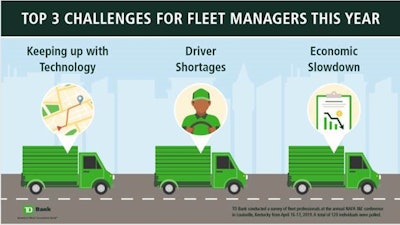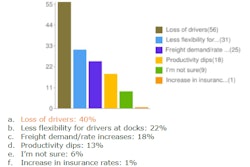A survey conducted by TD Bank’s equipment-finance group at the April-held annual expo of the NAFA Fleet Management Association showed more than half of the respondents naming new technology as posing the biggest challenge for the coming year.
 Approximately 6 in 10 survey respondents felt the freight economy would remain level or fall within the next year.
Approximately 6 in 10 survey respondents felt the freight economy would remain level or fall within the next year.Anthony Sasso, head of TD Equipment Finance, dubbed the shift under way a “major transformation” for truckers and trucking companies, coming at a time when survey respondents also see further potential for downturn as likely.
Though 59 percent of respondents reported anticipation of freight volumes to remain level or fall through the next year, 33 percent are expecting to increase the size of their fleets, reflecting the need to adjust business models and change the types of vehicles in their fleet to accommodate new delivery patterns, some to take advantage of so-called “last-mile” opportunities. Lease options for financing are growing — 50% of respondents indicated that they are more inclined to finance equipment acquisition through leases. Only 10% indicated they would prefer loans.
“Traditionally,” Sasso said, “the industry has been defined by trucks and infrastructure, but the use of mobile devices, GPS and electronics has revolutionized logistics.”

Adoption of vehicles capable of varying levels of autonomy has loomed over trucking for quite some time; among the fleet managers attending the NAFA expo, 61 percent reported they felt autonomous trucks would become mainstream within the next decade. Additionally, the use of alternative fuels, specifically with regard to electricity- and liquid natural gas-powered drivetrains, is top of mind for many. Nearly half of respondents (45 percent) would like to incorporate alternative fuel within the next three to five years. An additional 21 percent indicated that they would like to add alternative fuel but have found it to be cost-prohibitive.










